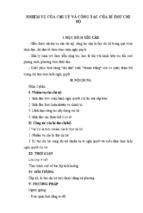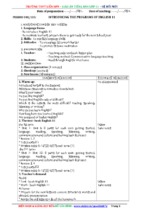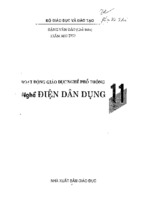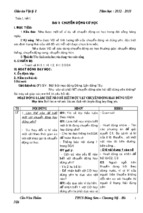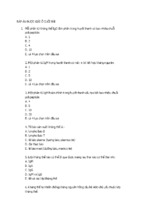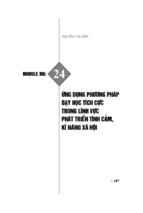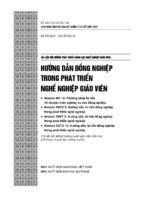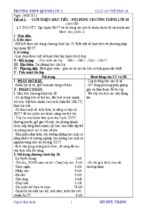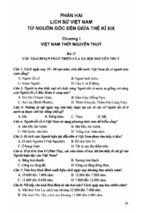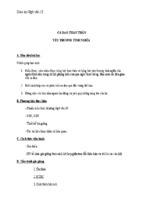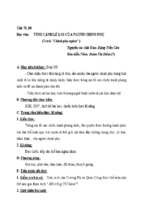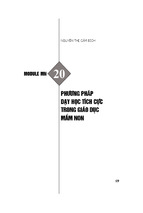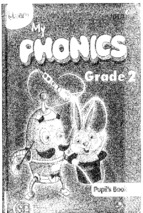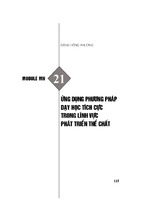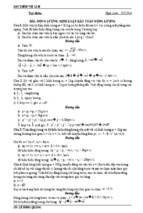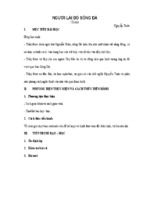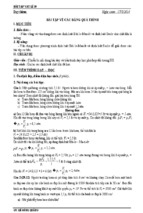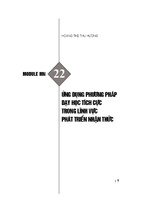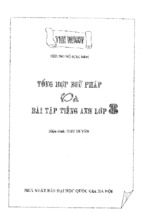Date of preparation:
Date of signature:
Week of teaching: 1-2
Period: 1-2
THEME 1: INFINITIVE WITH TO AND INFINITIVE WITHOUT TO
I. OBJECTIVES:
1. Aim: By the end of this lesson, students will be able to use infinitive with to and infinitive
without to.
2. Knowledge:
- Vocabulary:
- Grammar/ Structures: infinitive with to and infinitive without to
II. PREPARATION:
1. Teacher: textbook, workbook, chalk.
2. Students: textbooks, workbooks.
III. PROCEDURE:
Warm-up: (5’)
Game: Ordering
Rearrange the sentences so that they become meaningful:
a. hair / cut / his / to / immediately / he / needs.
b. apple / I / to / an / eat / want.
c. saw / she / climb / tree / the / cat / a.
d. go / out / his / let / last night / mother / him.
Expected answer:
a. He needs to cut his hair immediately.
b. I want to eat an apple.
c. She saw a cat climb the tree.
d. His mother let him go out.
2. New lesson:
A. To – Infinitive (20’)
* Presentation:
- Hang a poster on the board.
a. He needs to cut his hair immediately.
b. I want to eat an apple.
c. He wants something to eat.
d. It is too cold to go out.
- Ask Ss to underline the to + infinitive
- underline the phrase to + infinitive.
a. He needs to cut his hair immediately.
b. I want to eat an apple.
c. He wants something to eat.
d. It is too cold to go out.
- Comment on the use of to + infinitive
1. the to + infinitive can be placed after
- Ask the Ss to comment on the use of to + some verbs ( a, b )
infinitive in these examples.
2. the to + infinitive can be placed after
- Provide Ss with the use of to + infinitive.
nouns/pronouns ( c )
Optional Lesson Plan 11
+ Use:
* to indicate the purpose :
Ex: I get up early to walk.
* as a modifier to replace a relative clause
Ex: I have a lot of work to do ( which I have to
do)
* as an object of a verb
Ex: I like to walk.
* as an subject
Ex: It is healthful to walk every morning.
* in idiomatic expression :
Ex: The weather is too bad for me to walk
today.
3. the to + infinitive can be placed after
adjectives ( d )
* Practice:
4. That was very dangerous of Long to
give me 50,000 dong.
- Task 1: (Exercise 1, page 7, workbook)
- Ask Ss to work individually.
- Call on some Ss to give their answers.
- Give feedback
Feedback:
1. That was a very rude remark to make.
2. It was safer to go by train.
3. It was quite a surprise to see him
again.
5. It was very difficult for her to drive
the motorbike.
6. That was a very odd place to visit.
7. It was very silly of the boy to do that.
8. It was stupid of him to drive car like
that.
B. Bare infinitives ( without to ) (20’)
* Presentation:
- Hang a poster on the board.
- Ask Ss to underline the infinitive without to
a. My father doesn’t let me use his car.
-Copy down and underline the structure.
a. My father doesn’t let me use his car.
b. Her boss made her finish the report
by 5 p.m
c. He saw the cat catch a fish.
d. You had better not smoke.
b. Her boss made her finish the report by 5 e. She saw a cat climb the tree.
p.m
f. His mother let him go out.
c. He saw the cat catch a fish.
- Comment on the use of infinitive
d. You had better not smoke.
without to.
e. She saw a cat climb the tree.
1. infinitive without to can be placed
f. His mother let him go out.
after verbs of perceptions such as feel,
- Ask the Ss to comment on the use of hear, see, watch, smell, notice,.... ->
infinitive without to in these examples
refer to the complete action.
- Write the structure on the Bb
2. infinitive without to can be placed
after let/make somebody; had better
Optional Lesson Plan 11
S + Perceptive verbs + Object + Bare inf
- see - hear - listen to
- watch - feel - smell - taste
- observe , notice
- had better , would rather,
perceptive
verbs ( see, smell, feel, watch…)
* Other verbs : let make , help
* Practice:
Task 2: (Exercise 3, page 27, workbook)
- Ask Ss to work individually.
- Call on some Ss to give their answers.
- Give feedback
(not)/ should....
Feedback:
1. The teacher let him stay at home to
finish the assignment.
2. She noticed the boy run away from the
house.
3. I overheard him say that he didn’t
want to learn Math.
4. The policeman made the thief empty
his pockets.
5. I heard him leave the house early in
the morning.
6. She stood there and watch him drive
away.
7. I could feel the robber come from the
back door.
8. Do you think the school will make me
pay some extra money?
- Pick out the inf in the following sentences and describe the function of each
1. To find fault is easy.
2. It is delightful to hear the sound of the see.
3. The dog wants something to eat.
4. I saw him run the mile in four minutes.
5. Everybody wishes to enjoy life.
6. He is too ill to do any work.
7. I am not afraid to tell the truth.
8. He went to Paris to perfect his knowledge of French.
I.
TO INFINITIVE
a. It’s adj + (of sb)+ to V: ai đó thật như thế nào khi làm việc gì
Các tính từ sau dùng với cấu trúc này: kind, good, stupid, clever, careless, sensible, brave, timid,
coward, wise, rude, polite, generous, mean, thoughtful, tactful, selfish…
Ex: It’s kind of you to help me
You stole a car, which was stupid of you
b. S+ be + Adj + To V
Optional Lesson Plan 11
Các tính từ sau đây dùng với cấu trúc này: happy, sad, glad, nice, pleased, disappointed, difficult,
easy, eager, ready, surprised, sorry, hesitant, amazed, able, willing, reluctant,
sure/bound/certain.
Ex: I am very glad to see you again.
c. Động từ nguyên thể có “To” đứng ngay sau V
Agree đồng ý),
promise(hứa),
afford(có khả năng tài chính),
Plan(lập kế hoạch),
appear (dường như),
Pay(trả),
attempt (nỗ lực),
Prepare(chuẩn bị),
arrange(sắp xếp),
Refuse(từ chối),
cause(gây ra),
Threaten(đe dọa),
Choose (lựa chọn),
tend(xu thế),
decide(quyết định),
wish(ước),
demand (yêu cầu),
want( muốn).
Expect(mong đợi),
intend(dự định),
Fail(thất bại),
mange(quản lý),
Hope(hi vọng),
offer(đề nghị),
Hesitate(ngại, phiền),
claim
decide
beg
hope
mean (muốn
ask
deserve (xứng đáng)
afford
swear
Ex: I can’t afford to go abroad study
He agreed to work for us
She refused to answer personal questions
- like / love / prefer : dùng để diễn tả việc thích hoặc muốn làm 1 việc gì đó vào 1 thời điểm cụ
thể nào đó.
* Verb +O +To-infinitive:
Want s.o to
encourage s.o to
Need s.o to
remind s.o to
ask s.o to (hỏi , nhờ)
invite s.o to
Would like s.o to
permit s.o to
advise s.o to (khuyên)
allow s.o to
tell s.o to (bảo)
warn s.b to (cảnh báo)
request s.o to (yêu cầu);
order s.o to (ra lệnh)
require s.o to (đòi hỏi)
force s.o to
order s.o to (ra lệnh).
Ex: She advises me to leave here early.
III. WITHOUT “TO” INFINITIVE
1. Sau các động từ khuyết thiếu: can, could, may, might, should, had better … + V0
Optional Lesson Plan 11
2. help/ make/ have(nhờ ai làm) + (O) sb + V0
NOTE:
S + see/hear/watch/feel/notice/observe/smell + O + V0 (nhìn thấy toàn bộ sự việc)
S + see/hear/watch/feel/notice/observe/smell + O + Ving (nhìn thấy sự việc đang diễn
ra)
I. Put the verb in the brackets in the correct form.
1.
He wanted (see) _____________________the house where the
president was born.
2.
He is expected (arrive) _____________________in a few days.
3.
I would like him (go) _____________________ to a university but I
can’t (make) him go.
4.
I am looking forward to (see) _____________________ you.
5.
I arranged (meet) _____________________them there.
6.
He urged us (work) _____________________faster.
7.
I wish (see) _____________________the manager.
8.
It is no use (wait) _____________________him.
9.
He warned her (not touch) _____________________the wire.
10.
Don’t forget (clock) _____________________the door before (go)
_____________________to bed.
II. Put the verb in the brackets in the correct form.
1. I’ll lend you the book when I’ve finished (read) _____________it.
2. How old were you when you learned (drive) _____________.
3. My father gave up (smoke) _____________three years ago.
4. Would you mind (keep) _____________silent? I’m trying (study) _____________.
5. I always try to avoid_____________ (borrow) money from my friends.
6. The traffic was very heavy this morning, but I managed _____________ (get) to
school on time.
7. Could you please stop _____________ (make) so much noise?
8. I hope _____________ (run) in the marathon next month.
9. Look! It’s started _____________ (rain) again.
10. It was too late, so we decided_____________ (take) a taxi home.
11. My sister always enjoys _____________ (listen) to classical music.
12. I’ve put off _____________ (write) the letter so many times. I really must do it today.
13. Sarah gave up _____________ (try) to find a job in this country and
decided_____________ (go) abroad.
14. You can’t stop me _____________ (do) what I want.
15. They don’t have much money. They can’t afford_____________ (go) out very often.
16. I’m still looking for a job but I hope_____________ (find) something soon.
17. My mother can’t stand_____________ (stay) at home without doing anything.
18. You must promise_____________ (not / be) late again.
Optional Lesson Plan 11
19.
20.
21.
22.
I didn’t have enough time
(finish) my work yesterday.
He refused
( allow) her
( think) for herself.
I was relieved
(find out) that I had passed the exam.
She made her son _____(wash) the windows before he could go outside _____(play)
with his friends.
23. She lets her children
(stay) up very late.
24. We had nothing
(do) except look at the cinema posters.
25. We both heard him
(say) that he was leaving.
26. It made him angry
(wait) for people who were late.
27. I couldn’t understand what the passage said, so I had my friend
( translate)
it for me.
28. It’s important
( start) the meeting on time.
29. There are too many people here for me
(talk) to all of them.
30. It took ages
(download) the pictures from the Internet.
31. Whenever I have free time, I like
( watch) the basketball team
(practice).
32. She sent me an e- mail
( inform) me that the meeting had been canceled.
33. It was a thrill
( see) my brother
(win) the chess tournament last
year.
34. I must
( speak) to the manager.
35. It is lovely
( see) you again.
V. EVALUATION:
………………………………………………………………………………………………………………………………………………………………………………………
………………
Optional Lesson Plan 11
Date of preparation:
Week of teaching: 3-5
Period: 3-5
Date of signature:
THEME 2: PAST TENSES
I. AIMS:
By the end of the lesson, students will be able to review and use the present perfect and
past perfect
II. TEACHING AIDS: handouts, paper
III. PROCEDURES:
Stages
Presentatio
n
Teacher’s activities
I. The Past Simple Tense
1. Form to be
- Affirmative: S + V2/ed…. S + was/were……
- Negative: S + did + not + V….. S + was/were + no
- Interrogative: Did + S + V….? Was/Were + S ….?
2. Uses
a. Dieãn taû moät haønh ñoäng xaûy ra trong quaù khöù xaùc
ñònh roõ thôøi gian (yesterday, ago, last……, in the past,
in 1990)
Ex: - My father bought this house 10 years ago.
- Mr. Nam worked here in 1999.
b. Dieãn taû moät loaït caùc haønh ñoäng xaûy ra lieân tieáp
trong quaù khöù.
Ex: - Last night, I had dinner, did my homework,
watched TV and went to bed.
- When she came here in 1990, she worked as a
teacher.
II. The Past Progressive Tense
1. Form
- Affirmative: S + was/were + V-ing….
- Negative: S + was/were + not + V-ing…..
- Interrogative: Was/Were + S + V-ing….?
2. Uses
a. Dieãn taû moät haønh ñoäng xaûy ra ôû moät thôøi ñieåm
trong quaù khöù.
Ex: They were playing chess at 4 o’clock yesterday.
b. Dieãn taû moät haønh ñoäng ñang xaûy ra coù moät haønh
ñoäng khaùc xen vaøo trong quaù khöù (when, while, as).
Haønh ñoäng ñang xaûy ra duøng thì Past Progressive,
Optional Lesson Plan 11
Students’ activities
- Contribute their
ideas
- Make sentences
with the tense
- Give examples
- Give their ideas
- Take note on
their notebook
- Contribute their
ideas
- Make sentences
with the tense
- Give examples
- Give their ideas
- Take note on
their notebook
Practice
haønh ñoäng xen vaøo ra duøng thì Past Simple.
Ex: - I was studying my lessons when he came.
- We saw him while we were walking along the
street.
III. The Past Perfect Tense
1. Form
- Affirmative: S + had + V3/ed….
- Negative: S + had + not + V3/ed…..
- Interrogative: Had + S + V3/ed….?
2. Uses
a. Dieãn taû moät haønh ñoäng xaûy ra tröôùc moät thôøi ñieåm
trong quaù khöù.
Ex: By the end of last month, she had made 4 skirts.
b. Dieãn taû moät haønh ñoäng xaûy ra vaø hoaøn thaønh tröôùc
moät haønh ñoäng khaùc trong quaù khöù (before, after, by
the time). Haønh ñoäng xaûy ra tröôùc duøng thì Past
Perfect, haønh ñoäng xaûy ra sau duøng thì Past Simple.
Ex: - After Nam had done his homework, he went to
bed.
- They had lived in Dong Thap before they moved to
HCM city.
Put the verbs in blankets into the correct tense:
1. They (drive)______________ to school tomorrow.
2. Gene (eat)____________ dinner when his friend
called.
3. At three o’clock this morning, Eleanor (study)___.
4. John (write)______ his report last night.
5. After John (wash)________ his clothes, he began
to study.
6. Tim (go)____________ to France last year.
7. When the teacher (enter)___________the room,
the students were talking.
8. We (hold)________ a soccer match next Sunday.
9. Guillermo (call)_________his employer yesterday.
10. Jane sent a letter to his university after she
(receive) _______ her scholarship check.
11. The car (flip)_____ten times before it landed on
its roof.
12. While Joan was writing the report, Henry
(look)_____________ for more information.
Optional Lesson Plan 11
- Contribute their
ideas
- Make sentences
with the tense
- Give examples
- Give their ideas
- Take note on
their notebook
Individual work
- Do the task
individually
- Give their
answers
- Contribute their
ideas
- Copy down the
correct answers
in their
notebook
13. What you (do)______________ last weekend?
14. Mr. and Mrs. Ba (take)_________ some beautiful
photos a few days ago.
15. Her brother (talk)_______________ to his pen pal
on the phone at the moment.
16. They (not contact)_______ to each other for a
long time.
17. Nothing (be)_________ done since I moved here.
18. I used to walk to school when I (be)__________
in primary school.
19. He (go)_______________ to that book shop
tomorrow.
20. Lan (drink)_________ two bottles of water every
day.
21. Lan (be)__________ a Vietnamese student. She
(be)_____ born
in Ho Chi Minh city. She (go)______________
abroad last year to study English. She
(learn)______________ French before she began to
study English. She (make) ___________ great
progress since she (get)__________ there. Next
month, she will take the final exam. She
(be)_____________ able to get a good job when she
(return)________ to Vietnam.
IV. The Past Perfect Tense
1. Form
- Affirmative: S + had + V3/ed….
- Negative: S + had + not + V3/ed…..
- Interrogative: Had + S + V3/ed….?
2. Uses
a. Dieãn taû moät haønh ñoäng xaûy ra tröôùc moät thôøi ñieåm
trong quaù khöù.
Ex: By the end of last month, she had made 4 skirts.
b. Dieãn taû moät haønh ñoäng xaûy ra vaø hoaøn thaønh tröôùc
moät haønh ñoäng khaùc trong quaù khöù (before, after, by
the time). Haønh ñoäng xaûy ra tröôùc duøng thì Past
Perfect, haønh ñoäng xaûy ra sau duøng thì Past Simple.
Ex: - After Nam had done his homework, he went to
bed.
- They had lived in Dong Thap before they moved to
Optional Lesson Plan 11
Individual work
- Make sentences with
the tenses
- Write their answers
on the board
- Copy down the
correct answers on
their notebook
HCM city.
Put the verbs in blankets into the correct tense:
1. Bob (see)______________ this movie before.
2. Jorge (read)____________ the newspaper already.
3. Mr. Johnson (work)____________ in the same
place for 5 years.
4. We (not begin)_____________ to study for the test
yet.
5. We (not see)_____________ this movie yet.
6. Terry (mow)__________ the lawn yet.
7. John and I (be)______________ pen pals for nearly
3 years.
8. He (wear)___________ the same coat since he
(move)___________here.
9. After John (wash)________ his clothes, he began
to study.
10. Jane sent a letter to his university after she
(receive) _______ her scholarship check.
11. The car (flip)_____ten times before it landed on
its roof.
12. The sky (be) …………………..black sometime before
the rain (begin) ………………….to fall.
13. Before I (apply) …………………….for that job, I (ask)
………………….my parents for advice.
14. By the age of 35, my uncle (start) …….his own
business.
15. We (live) ………….in the house that my grandparents
(build) ………………………
16. They (go) ……….home after they (finish) ….their
work.
17. Before she (watch) …….TV, she (do) ……….her
homework.
18. After taking a bath, he (have) ……………….dinner.
- Get sts make sentences with the tenses
- Get sts to write their answers on the board
- Check sts' answers and then give comment
HANDOUT:
I. Put the verbs in the blanks in the past Simple
1.
Last night, he (write)some letters for his friends.
Optional Lesson Plan 11
2.
3.
4.
5.
6.
7.
8.
9.
10.
11.
12.
13.
14.
15.
16.
17.
18.
19.
20.
21.
22.
23.
24.
25.
26.
27.
28.
29.
30.
They( learn) foreign language with some their neighbor 2 hours ago?
He( look) at you at the last party?
She (not play) games this morning.
Hoa (prepare) her birthday party last week?
Where you (go) yesterday?
My mother (make) some cakes for us last weekend.
They( not stay) at home last month.
Tom and July (draw) picture in their house 4 hours ago?
Peter! Your father (teach) you to drive yesterday?
My sister (not sleep ) last night.
Mr Quang (open) the door for us last night.
What your father (do) in 2003?
Mai (repair) her TV set from last Monday to last Wednesday.
They (build) that bridge in 2004.
Hoa (not wait) for her friends last night.
They(go) on holiday, last year?
The teacher (come) to our house last month.
We (repair) our car from Sunday to Thursday last week.
Believe me! They (not do) their homework last night, come and see them.
Nurse! I (have) a terrible headache this morning.
Yesterday I(cook) some food for my parents, they (come) back home late.
You (phone) me last night?
Someone (break) our house yesterday. They (take) something away.
She (clean) our car 1 hour ago?
Two boys (fight) each other at the school gate last week?
My grandfather (not walk) in the park When he ( be) young.
The children (talk) together in the yard last Monday?
The child (lie) in the bed yesterday?
He ( not print) those documents for you yesterday.
II.
Put the verbs in the blanks in the Past continous / past Simple
31. At that time last night, he (write) some letters for his friends.
32. They( learn) foreign language with some their neighbor at this time yesterday?
33. He( wait) for you at 8 o’clock last night?
34. She (not play) games at this time last week.
35. Hoa (prepare) her birthday party at this time last month?
36. Where you (go) at 6 o’clock yesterday?
37. Susan (phone) you at that time last night.
38. My mother (make) some cakes for us at this time last weekend.
39. They( not stay) …at home at 7pm last Sunday evening.
40. Tom and July (draw) picture in their house at that time yesterday?
Optional Lesson Plan 11
41.
42.
43.
44.
45.
46.
47.
48.
49.
50.
51.
52.
53.
54.
55.
56.
57.
58.
Peter! Your father (teach) you to drive at this time yesterday?
My sister (not sleep ) at 4am this morning.
Mr Quang (open) the door for us at this time last night.
What your father (do) from 6pm to 7pm?
Mai (repair) her TV set when I (come).
They (build) that bridge during June last year.
Hoa (not wait) for her friends at 7pm last night.
They(go) on holiday at that time last year?
The teacher (drink) some coffee at this time last weekend.
We (repair) our car when you (come).
Believe me! They (not do) their homework at 6pm last night, they (play) games.
Mother! I (have) a bath at 5pm so I couldn’t hear your phone.
Yesterday at 8 pm I(cook) some food for my parents, they (paint) our house.
You (talk) to her at this time last night?
Someone (make) noise next to my house.
She (clean) our car when she ( come)?
Two boys (fight) each other at the school gate at 6pm yesterday?
My grandfather (not talk) with his friends at that time yesterday.
III. Put the verbs in the blanks in the Past perfect/ past perfect continuous.
59. Last night, he (write) some letters for 3 hours.
60. They ( learn) foreign language with some their neighbors for a long time last night?
61. He ( wait) for you until yesterday.
62. She (not know) how to play games until last year.
63. Hoa (prepare) her birthday party for 2 days last week?
64. Where you (be) 2 hours yesterday?
65. Susan (phone) you for three times last night.
66. My mother (make) some cakes for us several times last weekend.
67. They ( not stay) at home for 2 weeks last month.
68. Tom and July (draw) picture in their house for 3 hours last week?
69. Peter! Your father (teach) you to drive until yesterday?
70. My sister (not speak ) until last night.
71. Mr Quang (keep) the door openning for us for 1 hours last night.
72. What your father (do) until 2003?
73. Mai (repair) her TV set for 2 days last week.
IV. EVALUATION:
………………………………………………………………………………………………………………………………………………………………………………………
Optional Lesson Plan 11
Date of preparation:
Week of teaching: 7-8
Period: 7-8
Date of signature:
THEME 3: INFINITIVE AND GERUND
I. AIMS:
By the end of the lesson, students will be able to review and use the gerund or to
infinitive
II. TEACHING AIDS: handouts, paper
III. PROCEDURES:
Stages
Teacher’s activities
Students’ activities
- Contribute
Presentatio 1. Gerund (V-ing)
a. love, enjoy, mind, can’t stand, practice, suggest,
their ideas
n
keep, regret, fancy, finish, avoid, carry on, consider,
- Make
miss...
sentences
Ex: - I enjoy playing soccer.
with the
- My uncle kept talking about his farmlife.
tense
b. in, on, at, of, for,…
- Give
Ex: - The children are interested in playing soccer.
examples
- He has the trouble with doing this research.
- Give their
2. To-Infinitive (to-V)
ideas
want, decide, try, fail, pretend, prove, hope, agree,
- Take note
promise, happen, tend, plan, expect, threaten…
on their
Ex: - We all want to become better students.
notebook
- She decided to live in HCM city.
3. S + V + 0 + to-inf…
ask, want, get, tell, advise, allow, persuade, order,
invite,…
Contribute their
Ex:- My parents always want me to be a doctor.
ideas
- Nga asked Lan to return her book.
Make sentences
4. Notes
with the tense
- stop + V-ing: döøng haønh ñoäng ñang
- stop + to V: döøGive
ng laïexamples
i ñeå laøm vieäc
Give their ideas
laøm
khaùc
note
their
Ex: Stop making noise, please!
Ex: She stoppedTake
to talk
to on
him.
- try + V-ing: thöû laøm ñieàu gì
- try + to V: coá notebook
gaéng laøm vieäc gì
Ex:He tries writing with his left hand. Ex: We try to get high marks.
- remember +V-ing: nhôù ñaõ laøm gì
- remember + to V: nhôù phaûi laøm gì
Ex: I remember locking the door
Ex: I remember to call him.
before I left.
Optional Lesson Plan 11
- forget + V-ing: queân ñieàu gì ñaõ laøm
Ex: I forgot meeting her.
Practice
- forget + to V: queân laøm ñieàu gì
Ex: I forgot to shut the window.
Choose the correct word to complete each sentence
1. Are we allowed____ dictionaries in the exam room?
A. to use
B. using
2. The teacher asked Jim _________ his book to Ann.
A. to give
B. giving
3. We enjoy_____________ in a team
A. to work
B. working
4. Reading stories in English helps us____________
our writing skill.
A. improve/ to improve B. improving
5. I hope_____ better grades in English next semester.
A. to get
B. getting
6. Minh considers____ a French course next semester.
A. to take
B. taking
7. You should try_______ if you feel stressed at work.
A. to relax
B. relaxing
8. I certainly don’t regret____________ in our team.
A. to work
B. working
9. I wish_____________ a doctor when I grow up.
A. to be
B. being
10. We’ve planned___________ a vacation this year.
A. to take
B. taking
Write the correct form of a verb from the box in
each blank
help
learn
work
take
play
use
operate switch off bring
not
cry
1. Do you like_____________ in a team.
2. When did you start_______________ French?
3. I’ve decided____________ a temporary job at a
supermarket.
4. I don’t mind_____________ you if you’re tired.
5. Lam enjoys_____________ for his school’s soccer
team.
Optional Lesson Plan 11
Individual work
Do the task
individually
Give their answers
Contribute their
ideas
Copy down the
correct answers on
their notebook
Pair work
Do the task
individually
Compare their
answers with a
peer
Give their answers
Contribute their
Production
6. I could see she was very sad. When talking to me,
she tries____________.
7. Why did your uncle stop______________ his
business?
8. Don’t forget_____________ your dictionary to our
English class tomorrow.
9. Remember____________ the lights before you
leave the classroom.
10. Teacher to students: You are not
allowed__________ this door.
- Get sts make sentences with the tenses
- Get sts to write their answers on the board
- Check sts' answers and then give comment
ideas
Copy down the
correct answers on
their notebook
Individual work
- Make sentences
with the tenses
- Write their
answers on the
board
HANDOUT
INFINITIVE AND GERUND
I.
TO INFINITIVE
c. It’s adj + (of sb)+ to V: ai đó thật như thế nào khi làm việc gì
Các tính từ sau dùng với cấu trúc này: kind, good, stupid, clever, careless, sensible, brave, timid,
coward, wise, rude, polite, generous, mean, thoughtful, tactful, selfish…
Ex: It’s kind of you to help me
You stole a car, which was stupid of you
d. S+ be + Adj + To V
Các tính từ sau đây dùng với cấu trúc này: happy, sad, glad, nice, pleased, disappointed, difficult,
easy, eager, ready, surprised, sorry, hesitant, amazed, able, willing, reluctant,
sure/bound/certain.
Ex: I am very glad to see you again.
c. Động từ nguyên thể có “To” đứng ngay sau V
Agree đồng ý),
promise(hứa),
afford(có khả năng tài chính),
Plan(lập kế hoạch),
appear (dường như),
Pay(trả),
attempt (nỗ lực),
Prepare(chuẩn bị),
arrange(sắp xếp),
Refuse(từ chối),
cause(gây ra),
Threaten(đe dọa),
Choose (lựa chọn),
tend(xu thế),
decide(quyết định),
wish(ước),
demand (yêu cầu),
want( muốn).
Expect(mong đợi),
intend(dự định),
Fail(thất bại),
mange(quản lý),
Hope(hi vọng),
offer(đề nghị),
Optional Lesson Plan 11
Hesitate(ngại, phiền),
claim
decide
beg
hope
mean (muốn
ask
deserve (xứng đáng)
afford
swear
Ex: I can’t afford to go abroad study
He agreed to work for us
She refused to answer personal questions
- like / love / prefer : dùng để diễn tả việc thích hoặc muốn làm 1 việc gì đó vào 1 thời điểm cụ
thể nào đó.
* Verb +O +To-infinitive:
Want s.o to
encourage s.o to
Need s.o to
remind s.o to
ask s.o to (hỏi , nhờ)
invite s.o to
Would like s.o to
permit s.o to
advise s.o to (khuyên)
allow s.o to
tell s.o to (bảo)
warn s.b to (cảnh báo)
request s.o to (yêu cầu);
order s.o to (ra lệnh)
require s.o to (đòi hỏi)
force s.o to
order s.o to (ra lệnh).
Ex: She advises me to leave here early.
II. GERUND (DANH ĐỘNG TỪ- Ving)
1. Những động từ dùng với danh động từ:
admit (thừa nhận)
suggest (đề nghị)
risk : liều lĩnh
avoid (tránh)
give up
(bỏ)
recollect (hồi tưởng lại)
appreciate (đánh giá cao) hate (ghét)
regret (hối tiếc ,ân hận)
consider (cho là ,xem là)
imagine = fancy
resist ( ghịu được, chống lại)
continue
keep : tiếp tục
save
deny (phủ nhận)
mention (đề cập ,nói đến)
start / begin
delay (trì hoãn)
mind (phản đối,phiền)
support (ủng hộ)
detest = dislike : ko thích
mean (invole)
understand
discuss (talk about)
miss (nhớ /bỏ lỡ)
spend
dread: sợ)
prefer (thích hơn)
enjoy (thưởng thức)
prevent (ngăn)
escape (trốn thoát
postpone = put off (trì hoãn)
finish (hoàn thành)
quit: từ bỏ
forgive
recall (gợi lại,nhớ lại)
like / love / hate / enjoy / dislike + V-ing : sở thích
* Preposition +gerund(giới từ +gerund):
Be interested in (thích thú)
think about (nghĩ về)
apologize for (xin lỗi về)
Optional Lesson Plan 11
Insist on (khăng khăng về)
talk about (nói về)
instead of (thay vì)
Be accustomed to
look forward to ( mong đợi )
be familiar with
be / get used to
quen /thích nghi với
* Những thành ngữ với gerund (expressions +gerund):
- can’t help = can’t bear = can’t stand = can’t resist (không thể chịu được)
- it is no good / it is no use (vô ích / không có ích)
- there’s no point in …
- What’s the point of…
- would you mind + V-ing ? (xin ông làm ơn…)
- do you mind + V-ing ? (bạn có phiền không…)
- have trouble (lo lắng, phiền muộn)
- there is no… (không còn cách)
- be use to = get used to = be accustomed to : quen / thích nghi với…
- Have a good time: vui vẻ
- Have a hard time = have difficulty : gặp khó khăn
- S + prefer + V-ing + to + V-ing : thích làm việc gì hơn việc gì khác
* Adjectives + gerund: Be busy + V-ing (bận rộn)
be worth + V-ing (đáng ,xứng
đáng)
Ex: I couldn’t avoid meeting him
Have you finished talking?
She enjoys playing tennis
2. Danh động từ đúng sau giới từ : at, on, in, before, after, with, up, without, by, in
addition to…..
Ex: we can improve our English by practicing much
He came in without saying hello to anybody
On getting home, he sat down to write a letter
In addition to going to university she also takes a part- time job
Before going to bed, I clean my teeth
3. Đi với một số thành ngữ cố định:
+ can’t help = can’t bear = can’t stand: không thể không
+ It’s (not) worth : Đáng (không đáng làm gì)
+ It’s no use = it’s no good= there be no point in Ving: làm gì đó là vô ích
+ S + have/has difficulty/trouble + in + Ving: gặp khó khăn, rắc rối
+ have (any) problem in Ving
+ have a good time + Ving
+ have a hard/difficult time + Ving
Note:
+ Stop + to V: dừng lại để làm gì
Ex: He stops smoking
Ving: dừng lại không làm nữa
He stops to eat
+ remember + To V: nhớ phải làm gì(HT, TL)
Optional Lesson Plan 11
Ving: nhớ đã làm gì(QK)
Ex: Remember to post my letter
I remember locking the door before going out
+ forget + To V: quên phải làm gì (HT, TL)
Ving: quên đã làm gì, sẽ không bao giờ quên là
Ex: Don’t forget to buy shoes for me
I’ll never forget meeting him
+ regret + To V: lấy làm tiếc(dùng để thông báo)
Ving : hối tiếc, ân hận vì đã làm
Ex: I regret to inform you that your application isn’t acceptable
I regret buying a lot of shares
+ try + To V: cố gắng làm gì
Ex: I try to get better marks
Ving: thử làm gì
I try solving this difficult sum
+ mean + To V: có ý định làm gì = intend
Ving: đưa đến hậu quả gì = result in
Ex: I don’t mean to buy that house
His new job means earning a lot of money
+ need + To V : cần làm gì (mang tính chủ động chỉ người)
Ving: cần được làm gì (mang tính bị động chỉ vật)
Ex: I need to sell some good
My trousers need ironing
NOTE: advise/allow/permit/forbid/encourage/recommend + (O)Sb + To V
Ving
Ex: they allow me to buy a new car
I don’t allow smoking in the room
4. “go +V-ing”:
Go camping (đi cắm trại)
go shopping (đi mua sắm)
go swimming
Go dancing (đi khiêu vũ)
go fishing (đi câu cá)
go sightseeing
I. Put the verb in the brackets in the correct form.
1.
Would you mind (show) _____________________me how (work)
_____________________the lift.
2.
After (walk) ___________three hours we stopped (rest)
___________and let the others (catch) _____________up with us.
3.
I am beginning (understand) _____________________what you
mean.
Optional Lesson Plan 11
4.
The boy likes (play) _____________________games but hates (do)
________________exercises.
5.
I regret (inform) _____________________you that your application
has been refused.
6.
I don’t allow (smoke) _____________________in my drawing-room.
7.
I don’t allow my family (smoke) _____________________at all.
8.
He surprised us all by (go) _________________away without (say)
________________‘Good-bye’.
9.
Please go on (write) _____________________; I don’t mind
_____________________ (wait).
10.
He wore glasses (avoid) (be) _____________________recognized.
11.
Before (give) _______________evidence you must swear (speak)
___________________the truth.
12.
I tried (persuade) ____________________him (agree)
_____________________with your proposal.
13.
Your windows need (clean) ______________.Would you like me
(do) ___________them for you.
14.
Would you mind (shut) _______________the window? I hate (sit)
_______________in a draught.
15.
I can’t help (sneeze) ____________; I caught a cold yesterday form
(sit) _________in a draught.
16.
Stop (talk) _____________________; I am trying (finish)
_____________________a letter.
17.
His doctor advised him (give) _____________________up (jog)
_____________________.
18.
My watch keeps (stop) _____________________.
19.
People used (make) _____________________fire by (rub)
_________________two sticks together.
20.
He hates (answer) the phone, and very often just lets it (ring).
21.
If you go on (let) ______your dog (chase) ________cars he will end
by (be) _____________run over.
22.
I prefer (drive) _____________________to (be)
_____________________driven.
23.
I advise you (start) _____________________ (look)
_____________________for a flat at once.
24.
Would you mind (lend) _____________me some money? I forgot
(cash) __________ a cheque.
25.
(Lie) _____________on the beach is much more pleasant than (sit)
_____________in the office.
Optional Lesson Plan 11
26.
She like her children (go) _____________to the dentist every six
months.
27.
An instructor is coming (show) _____________us how (use)
_____________the machine.
28.
I have no intention of (go) _________to that film; I couldn’t bear
(see) _____________my favorite actress in such dreadful part.
29.
I suggest (telephone) __________the hospitals before (ask)
_____________the police (look) _____________for him.
30.
After (hear) _____________the conditions I decided (not enter)
_____________for the competition.
31.
Some people seem (have) _____________the passion for (write)
_____________to the newspapers.
32.
He expects me (answer) ___________by return but I have no
intention of (reply) _____________at all.
33.
He postponed (make) _____________a decision until it was too late
(do) _____________anything.
34.
Try (forget) _____________it; It isn’t worth (worry)
_____________about it.
35.
There is no point in (remain) ____in a dangerous place if you can’t do
anything (help) ___the people who have (stay) ____there.
36.
The horse won’t be well enough (run) _____in tomorrow’s race. He
doesn’t seem (have) _____recovered from his long journey.
37.
At first I enjoyed (listen) _________to him but after a while I got
tired of (hear) _____________the same story again and again.
38.
It is usually easier (learn) _____________a subject by (read)
_____________books than by (listen) _____________ to lectures.
39.
It wouldn’t be safe (start) __________down now; we will have (wait)
_____________till the mist clears.
40.
After (discuss) ________the matter for an hour the committee
adjourned without (have) _____________ reached any decision.
41.
It’s not much use (have) _____________a bike if you don’t know how
(use) _____________it.
42.
I distinctly remember (pay) _____________him. I gave him 2$.
43.
Did you remember (give) _____________him the key of the safe? No, I didn’t. I will go and do it now.
44.
Please forgive me for (interrupt) ________you but would you mind
(repeat) __________that last sentence.
45.
He made a lot of money by (buy) ____tickets in advance and (sell)
_____________them twice the price on the day of the match.
II. Choose the best answer
Optional Lesson Plan 11
- Xem thêm -


